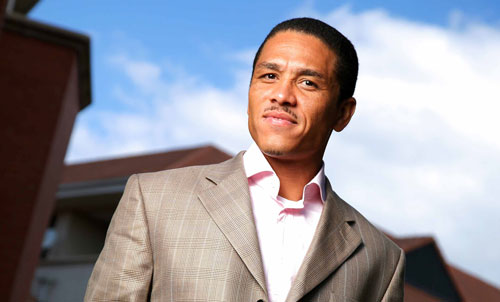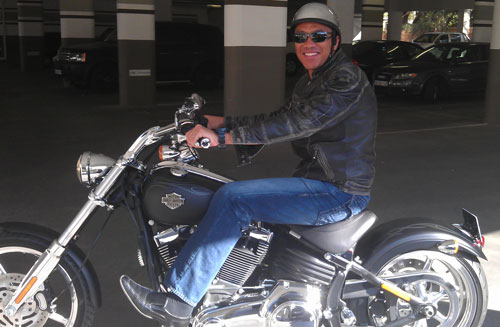
Stafford Masie, just 37, has had a highly eventful career, having been the first SA country manager for Google and working for multinational corporations like Novell. He’s now dabbling in numerous start-ups and technology businesses. TechCentral’s Craig Wilson sat down with him recently to hear about his history and his passion for tech.
“I’ve always said I don’t have a plan or a blueprint, I don’t see beyond 36 months,” Masie says by way of introduction. “A lot of my personal goals I don’t set too far, either. I think it’s good to assume you won’t live beyond another 36 months. When you do that you have a greater parity of execution, a game plan seems more real, and you seem to be able to do things that matter more.”
Masie says he’s coming into contact with a lot of students through his various companies and his regular speaking engagements. Many of them ask what they should do after studying, as if there’s some ideal path to follow.
“The whole notion of a career is outdated,” he says. The best advice he can offer is largely inspired by the Steve Jobs’s now famous Stanford commencement address: “Fear comfort, don’t be comfortable in your job, and work on stuff that matters.”
 As an angel investor, Masie deals with a lot of developers and entrepreneurs and says they should always ask themselves whether what they’re doing really matters.
As an angel investor, Masie deals with a lot of developers and entrepreneurs and says they should always ask themselves whether what they’re doing really matters.
Masie now has seven tech start-ups under his wing, three of which are in the payment space under the group name of MPFE. It stands for, wait for it, “Making Payments Fucking Easy”. He says the payments sector is “ready for disruption” and a space where he believes he can make a big difference.
“In tech, there’s a swarming, herd mentality where people drift from one side to another,” Masie says. As a result, it often takes a newcomer to fix a system that’s broken. He suggests mobile payments could be just such a system, and that those trying to make it work are too focused on the merchants, the technology and the ecosystem rather than what users want.
He’s excited by all things technological and says tech is becoming ubiquitous. “Technology is no longer technology, it’s everything,” he says, without meaning to sound hyperbolic. “It’s no longer a niche. It’s health care, supply chain, manufacturing, banking … and the real question is how do you deal with that?”
According to Masie, chief information officers need to see their role as “ecosystem custodian officers”. He says technology is “not about a group of experts anymore”.
One of the words Masie uses often is “open”. He says there’s great value in making all kinds of data available, “even if we don’t know what to do with it yet.”
By way of example, he points to car manufacturer Nissan’s Leaf. “The Leaf has open software and even the physical interfaces are hackable. Someone actually even went as far as creating a better power cable that’s cheaper and charges faster, and they published the specifications for public use.”
Another of Masie’s projects is the “open source electronics prototyping platform” Arduino. He says that although not everything is connected to Internet, Arduino is trying to “put the Internet into everything”.
He hopes to see more and more inanimate objects imbued with the ability to communicate information, and to see this information made publicly available.
Masie employs 14 engineers and developers, whom he houses so they needn’t worry about “basics like bread and milk” and can focus on coding instead. He says people often ask him how he builds such successful teams and he says it’s because of a mantra he subscribes to: “Choose insane passion and perpetual positivity intermingled with integrity over any level of competency.”
The last time Masie had a “real” job was during his stint as the first SA country manager at Google. He says since then he’s been “dabbling, understanding, and failing”. He says failing is a good thing and that businesses need to learn to embrace it. “Failing is data. And you can’t always look at others’ failures to get it.”
Masie recently founded a new company with submarine telecommunications cable operator Seacom called Pamojo, which takes its name from the Swahili word for “together”. He says the company’s objective is to bring “multinational content platforms” into Africa. “We want to personify cloud infrastructure in Africa for the first time and bring rack space to the continent.”
Masie says rack space — place for servers in data centres — will be available from early next year at competitive prices.
 ‘Super ADD’
‘Super ADD’
Masie describes himself as “super ADD”. In the past 18 months, he’s even found time to write a book — currently in the final editing phase – called Digital Clash of Civilisations, which will be out next year.
Masie lived in Israel in the late 1980s and early 1990s before returning to SA and taking a job at Telkom. “It was fun to work in that environment, with the best networking people, many of whom are still in the industry today.”
Masie left Telkom after sitting down with one of its executives, Andy Mills, who asked him what he wanted to do with his life and then advised him to move on.
Mills gave him a copy of Nicholas Negroponte’s book Being Digital, which Masie says encouraged him to move to Dimension Data where he was meant to “build software competency inside their business application design”.
The project didn’t take off and Masie realised what he really wanted to do was build a software company. Gareth Tindall, then a Didata executive, suggested to him that he do just that, but elsewhere as the timing wasn’t right for the IT company.
“I got a cheque from someone, a cash cheque for a large sum, to go and build this business,” he recalls. “I just had to promise not to use the money on myself.” Masie invested some of the cash in a technology services company but soon realised he’d wound up with a business where salesmen were rewarded and engineers were largely ignored.
“I wanted a company that was about the engineers,” says Masie, “and that’s when I bumped into Novell”. Masie was offered a position at the US company and took it, mainly because the software space was one area of the technology business to which he’d had little exposure.
While at Novell, Masie met then-CEO, Eric Schmidt, who later became CEO of Google. Schmidt would later offer him “global responsibilities” and the chance to oversee some of Novell’s activities in Latin America, the Middle East and the Rocky Mountain district of the US.
“My objective was to articulate strategy to top executives and then get the company to make products to match that strategy.”
During this period, Masie also met Google co-founders Larry Page and Sergey Brin. The two men were then still students at Stanford University.
When Schmidt moved to Google in 2001 — much to the surprise of Novell and his colleagues, particularly in light of collapse of the dot-com bubble — Masie was in the process of deciding whether or not to throw in the technology towel and follow his dream of becoming a rescue helicopter pilot — something he says he still wants to do when he “grows up”.
Chris Stone, then the vice-chairman of Novell, got wind of Masie’s plans and asked him to take over from the outgoing SA country manager. He asked Masie to give Novell three years. He took the job and “rebooted” Novell’s SA office.
After than stint, Masie was again convinced he was going to leave the tech space and was making plans to do so when he heard that Google was setting up an SA office and wanted a country manager. A few calls, e-mails and an interview in London later and he landed the job.
“Google is an amazing company,” says Masie. “I was engaging with some of the smartest people I’ve ever worked with. I probably left a little prematurely, but it was for personal reasons. I felt successful in my professional life, but not my personal life, and had to fix that.”
Masie always wanted to be a pilot, having grown up watching television shows like Mirage and films like Top Gun. He says his love of technology doesn’t come from his childhood, although he did like “dismantling things”.
Hooked on tech
Masie remains committed to technology. Quoting the late Roy Amara, he says: “We tend to overestimate the effect of a technology in the short run and underestimate the effect in the long run.” He thinks technology now is where electricity was when it first became useful.
“We didn’t know what electricity was going to do. But then three things happened: there was the move from owning to access and the ability to get it from far away; there was a standard way to access it; and there was a socially acceptable per wattage minute cost. It moved further from us, but became more useful.”

With cloud computing, Masie believes the same thing is happening in the world of technology. He says one of the examples of this is how the world has progressed from a product like Windows 95 that required a “box of ‘stiffy’ discs and a manual” to a product like the iPad that doesn’t even come with a manual.
Masie is also thinking about another book based on experiences he had during a dark time in his life. “I was having a need-to-read-the-speech moment,” Masie says, meaning Steve Job’s Stanford address.
“I picked up a white beggar and bought him a meal in exchange for him telling me his story. My God, if you ever think you’re something, or you’re down and depressed, go and do that. Go talk to someone who’s really got nothing.”
Masie repeated the process nine times over three months and recorded every conversation from the second one on. He was astounded by the “appreciation, insight and experience these people could accumulate from a street corner”.
He says it reminded him that life can change completely in an instant and that a single choice can change a person’s life completely. He’s since promised himself he’ll do something similar during the first quarter of every year.
“Get rid of television in your home. When you don’t have one, start learning to play a musical instrument,” Masie offers by way of general life advice. He recently took up the guitar and says he hopes to make more time for it next year, in between juggling his various companies, finding time to scuba dive and fly microlights, and riding his favourite possession, his Harley-Davidson motorcycle. — Craig Wilson, TechCentral
- Subscribe to our free daily newsletter
- Follow us on Twitter or on Google+ or on Facebook
- Visit our sister website, SportsCentral (still in beta)

